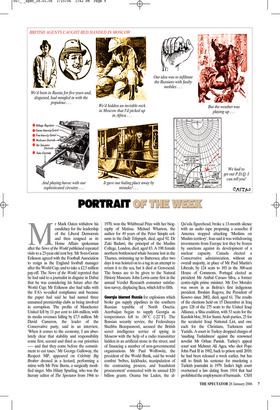PORTRAIT OF THE WEEK M r Mark Oaten withdrew his candidacy
for the leadership of the Liberal Democrats and then resigned as its Home Affairs spokesman after the News of the World publicised repeated visits to a 23-year-old rent boy. Mr Sven-Goran Eriksson agreed with the Football Association to resign as the England football manager after the World Cup, and to take a £2.5 million pay-off. The News of the World reported that he had said to a journalist in disguise in Dubai that he was considering his future after the World Cup; Mr Eriksson also had talks with the FA’s so-called compliance unit because the paper had said he had named three unnamed premiership clubs as being involved in corruption. The profits of Manchester United fell by 11 per cent to £46 million, with its media revenues falling by £7.5 million. Mr David Cameron, the leader of the Conservative party, said in an interview, ‘When it comes to the economy, I am absolutely clear that stability and responsibility come first, second and third as our priorities –— and that they come before the commitment to cut taxes.’ Mr George Galloway, the Respect MP, appeared on Celebrity Big Brother dressed in a leotard, performing a mime with Mr Pete Burns, a surgically modified singer. Mrs Hilary Spurling, who was the literary editor of The Spectator from 1966 to 1970, won the Whitbread Prize with her biography of Matisse. Michael Wharton, the author for 49 years of the Peter Simple column in the Daily Telegraph, died, aged 92. Dr Zaki Badawi, the principal of the Muslim College, London, died, aged 83. A 19ft female northern bottlenosed whale became lost in the Thames, swimming up to Battersea; after two days it was hoisted on to a tug in an attempt to return it to the sea, but it died at Gravesend. The bones are to be given to the Natural History Museum. John Lewis came first in the annual Verdict Research consumer satisfaction survey, displacing Ikea, which fell to fifth.
Georgia blamed Russia for explosions which broke gas supply pipelines in the southern Russian republic of North Ossetia. Azerbaijan began to supply Georgia as temperatures fell to -30°C (-22°F). The Russian security service, the Federalnaya Sluzhba Bezopasnosti, accused the British secret intelligence service of spying in Moscow with the help of a radio transmitter hidden in an artificial stone in the street, and of financing a number of non-governmental organisations. Mr Paul Wolfowitz, the president of the World Bank, said he would combat ‘bribes, kickbacks, manipulation of the contracting process, and fraudulent procurement’ connected with its annual $20 billion grants. Osama bin Laden, the al Qa’eda figurehead, broke a 13-month silence with an audio tape proposing a ceasefire if America stopped attacking ‘Muslims on Muslim territory’. Iran said it was withdrawing investments from Europe lest they be frozen by sanctions against its development of a nuclear capacity. Canada elected a Conservative administration, without an overall majority, in place of Mr Paul Martin’s Liberals, by 124 seats to 103 in the 308-seat House of Commons. Portugal elected as president Mr Anibal Cavaco Silva, a former centre-right prime minister. Mr Evo Morales was sworn in as Bolivia’s first indigenous president. Ibrahim Rugova, the President of Kosovo since 2002, died, aged 61. The results of the elections held on 15 December in Iraq gave 128 of the 275 seats to the United Iraqi Alliance, a Shia coalition, with 53 seats for the Kurdish bloc, 58 for Sunni Arab parties, 25 for the secularist Iraqi National List, and one each for the Christians, Turkmens and Yazidis. A court in Turkey dropped charges of ‘insulting Turkishness’ against the renowned novelist Mr Orhan Pamuk. Turkey’s appeal court sent Mehmet Ali Agca, who shot Pope John Paul II in 1982, back to prison until 2010; he had been released a week earlier, but has still to finish his sentence for murdering a Turkish journalist in 1979. India’s high court overturned a law dating from 1914 that had prohibited the employment of barmaids. CSH






















































 Previous page
Previous page